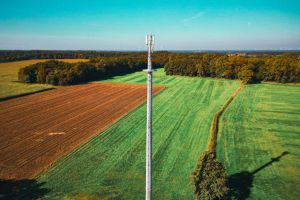Closing farming’s connectivity gap
According to a recent BBC article, connectivity issues are holding back British farming. Poor broadband and mobile connectivity "significantly hinder" farmers’ ability to run effective, food-producing businesses, says the National Farmers’ Union (NFU). With many farmers still unable to access fibre, 4G and 5G services — and with the PSTN switch-off deadline looming and the 3G switch-off underway — what can be done to future-proof Britain’s farms? Here, Kristian Torode, Director and Co-Founder of business comms provider Crystaline, explores.
A 2024 survey of 755 NFU members revealed that only 38 per cent consider their broadband adequate for business needs, while 57 per cent report download speeds of less than ten Megabits per second (Mbps). This figure is significantly lower than the national average speed of 69.4 Mbps and falls well below the UK government’s nationwide target of 1,000 Mbps — or Gigabit-capable internet — by 2030.
Meanwhile, mobile connectivity does not fare much better. Although 94 per cent of farmers have some access to 4G, only 51 per cent of them report acceptable coverage and fewer than a quarter can make or receive calls across their entire farm.
Infrastructure issues
 These challenges will only become more pronounced as the UK begins to phase out its older connectivity infrastructure. For example, the upcoming Public Switched Telephone Network (PSTN) switch off on January 31 2027, will see the copper wires used to run the UK’s telephony system turned off. After this date, making phone calls from a landline will require a reliable internet connection. Likewise, 3G will no longer be available in the UK after the end of 2025, meaning that reliable 4G or 5G connectivity will be essential for mobile communications.
These challenges will only become more pronounced as the UK begins to phase out its older connectivity infrastructure. For example, the upcoming Public Switched Telephone Network (PSTN) switch off on January 31 2027, will see the copper wires used to run the UK’s telephony system turned off. After this date, making phone calls from a landline will require a reliable internet connection. Likewise, 3G will no longer be available in the UK after the end of 2025, meaning that reliable 4G or 5G connectivity will be essential for mobile communications.
Without access to robust digital infrastructure to replace these technologies, farmers risk being left without functioning communication systems, which could endanger their safety in the case of accidents or break-ins.
This lack of connectivity also leaves many rural businesses struggling to stay competitive. For example, it limits farmers’ ability to leverage precision farming techniques driven by the Internet of Things (IoT), which can optimise crop yields through real-time monitoring of soil conditions, weather and resource usage. Farmers may also face hurdles in accessing government grants, training resources and online marketplaces, restricting opportunities for innovation and diversification.
So, what is being done to tackle this growing digital divide?
Upgrades in progress
Farmers and other rural businesses stand to benefit from government-backed initiatives like Project Gigabit, a £5 billion programme to improve fibre connectivity in hard-to-reach areas. With over £1 billion now awarded in contracts, the scheme’s progress will ensure that farmers are not left behind in the digital switchover.
Similarly, the Shared Rural Network (SRN) — a collaboration between the country’s ‘big four’ mobile network operators (MNOs) of EE, O2, Vodafone and Three — aims to deliver 4G coverage to 95 per cent of the UK by the end of 2025 and nationwide by 2027.
However, according to a National Audit Office report released in February 2024, the programme is behind schedule and it is unclear whether it will be delivered on time. Progress must accelerate to meet these targets and ensure that rural communities are not disadvantaged when it comes to connectivity.
While systemic improvements are underway, farmers can take proactive steps to future-proof their communications systems. Single Order Generic Ethernet Access (SoGEA) broadband is available nationwide and provides a cost-effective and reliable alternative to older broadband connections such as asymmetric digital subscriber lines (ADSL).
Upgrading their analogue landline to a Voice over Internet Protocol (VoIP) phone line will allow farmers to continue making phone calls over the Internet after the PSTN switch off. Providers like Crystaline specialise in offering tailored setups to ensure farms and other rural businesses can benefit from uninterrupted connectivity.
As farming evolves, reliable connectivity is no longer optional but essential for safety, business and educational purposes. Addressing these challenges will require a concerted effort from government and telecom providers, as well as proactivity from the farming community. By investing in modern solutions now, British farmers can ensure resilience and growth in an increasingly digital future.
For expert advice on future-proofing your business’s connectivity, get in touch with the Crystaline team.
- Log in to post comments

